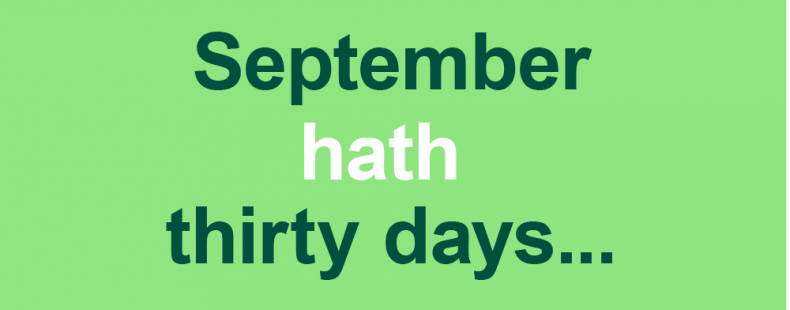Just about every elementary schooler learns the months of the year with an easy rhyme: “Thirty days has [or hath] September, April, June, and November. All the rest have 31, except February …”
How exactly does it end? That depends on how you learned the poem, but one common version goes: “All the rest have 31 / But February’s 28 /
The leap year, which comes once in four / Gives February one day more.”
Although this poem has changed through time, its first lines continue to help us remember the idiosyncrasies of our calendar. (Fun fact: rhymes or phrases that help you remember something are called mnemonics, named after the Greek goddess of memory, Mnemosyne.)
Exactly how old is this poem?
This mnemonic helps us keep our months and days straight. But, where did it come from? The rhyme has been attributed to many different sources, including Mother Goose, but a Welsh scholar may have uncovered its earliest source. He claims that the poem actually dates back to at least 1425. It was found written in English in a manuscript that included information about saints’ days. A version of the poem was first published in 1562.
Originally, the poem read: “Thirty days hath November, April, June and September …” Since November and September rhyme and they have the same number of syllables, they can easily switch places in the poem. The usefulness of the rhyme continues even as its linguistic conventions change. We’d never say “hath” nowadays, so the poem has evolved to reflect our current variation of hath: has.
Will the calendar ever change?
This poem also obviously relies on the calendar staying the same. We’ve been using the Gregorian calendar (and its similar predecessor, the Julian calendar) for quite some time. The Gregorian calendar was formally adopted by Britain and its colonies in 1752.
Recently, though, an economist and an astrophysicist at Johns Hopkins University developed a new calendar that would not require a leap year and allow dates to occur on the same day every year. As a result, September would be one of four months to have 31 days. So they’d have to think of a new rhyme.
Can you think of other useful mnemonic devices that rely on rhyme and word play?
Make a date with some other compelling articles about the calendar, such as the mysterious origins of April and why we even have a leap year.














